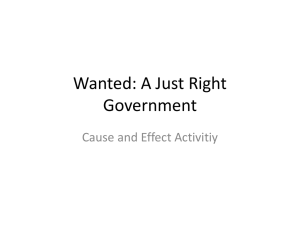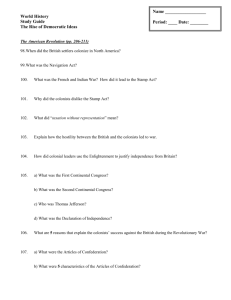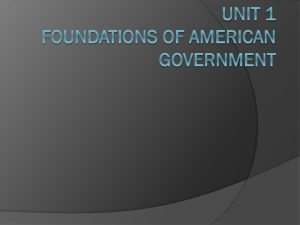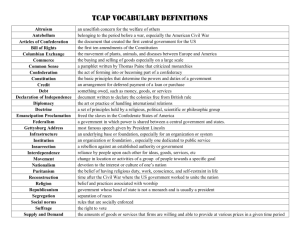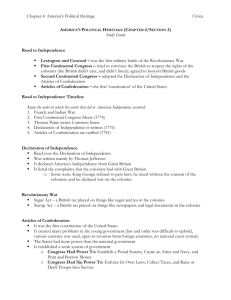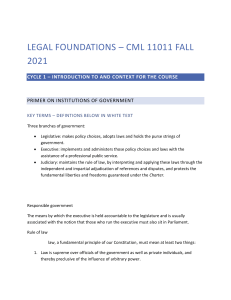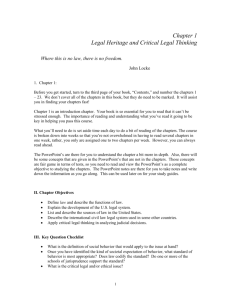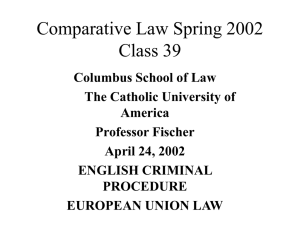APUSH/Unit 2 Test Review
advertisement
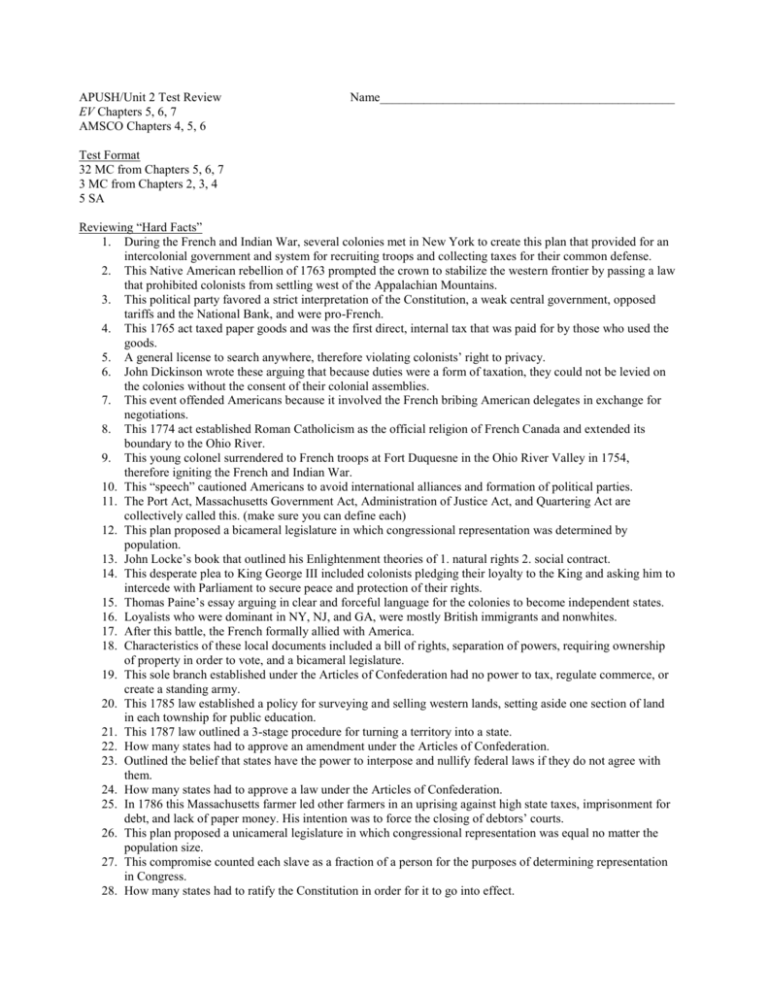
APUSH/Unit 2 Test Review EV Chapters 5, 6, 7 AMSCO Chapters 4, 5, 6 Name_______________________________________________ Test Format 32 MC from Chapters 5, 6, 7 3 MC from Chapters 2, 3, 4 5 SA Reviewing “Hard Facts” 1. During the French and Indian War, several colonies met in New York to create this plan that provided for an intercolonial government and system for recruiting troops and collecting taxes for their common defense. 2. This Native American rebellion of 1763 prompted the crown to stabilize the western frontier by passing a law that prohibited colonists from settling west of the Appalachian Mountains. 3. This political party favored a strict interpretation of the Constitution, a weak central government, opposed tariffs and the National Bank, and were pro-French. 4. This 1765 act taxed paper goods and was the first direct, internal tax that was paid for by those who used the goods. 5. A general license to search anywhere, therefore violating colonists’ right to privacy. 6. John Dickinson wrote these arguing that because duties were a form of taxation, they could not be levied on the colonies without the consent of their colonial assemblies. 7. This event offended Americans because it involved the French bribing American delegates in exchange for negotiations. 8. This 1774 act established Roman Catholicism as the official religion of French Canada and extended its boundary to the Ohio River. 9. This young colonel surrendered to French troops at Fort Duquesne in the Ohio River Valley in 1754, therefore igniting the French and Indian War. 10. This “speech” cautioned Americans to avoid international alliances and formation of political parties. 11. The Port Act, Massachusetts Government Act, Administration of Justice Act, and Quartering Act are collectively called this. (make sure you can define each) 12. This plan proposed a bicameral legislature in which congressional representation was determined by population. 13. John Locke’s book that outlined his Enlightenment theories of 1. natural rights 2. social contract. 14. This desperate plea to King George III included colonists pledging their loyalty to the King and asking him to intercede with Parliament to secure peace and protection of their rights. 15. Thomas Paine’s essay arguing in clear and forceful language for the colonies to become independent states. 16. Loyalists who were dominant in NY, NJ, and GA, were mostly British immigrants and nonwhites. 17. After this battle, the French formally allied with America. 18. Characteristics of these local documents included a bill of rights, separation of powers, requiring ownership of property in order to vote, and a bicameral legislature. 19. This sole branch established under the Articles of Confederation had no power to tax, regulate commerce, or create a standing army. 20. This 1785 law established a policy for surveying and selling western lands, setting aside one section of land in each township for public education. 21. This 1787 law outlined a 3-stage procedure for turning a territory into a state. 22. How many states had to approve an amendment under the Articles of Confederation. 23. Outlined the belief that states have the power to interpose and nullify federal laws if they do not agree with them. 24. How many states had to approve a law under the Articles of Confederation. 25. In 1786 this Massachusetts farmer led other farmers in an uprising against high state taxes, imprisonment for debt, and lack of paper money. His intention was to force the closing of debtors’ courts. 26. This plan proposed a unicameral legislature in which congressional representation was equal no matter the population size. 27. This compromise counted each slave as a fraction of a person for the purposes of determining representation in Congress. 28. How many states had to ratify the Constitution in order for it to go into effect. 29. This political group opposed the proposed Constitution, fearing it would give the national government too much power. Refused to ratify it unless a bill of rights was added. 30. 85 essays written by Madison, Hamilton, Jay presented reasons for believing in the practicality of each major provision of the Constitution. 31. Washington’s Secretary of State. 32. Established a Supreme Court with one chief justice and five associate judges. Gave Supreme Court power to rule on constitutionality of decisions made by state courts. Provided for a system of 13 district courts and three circuit courts of appeals. 33. His plan proposed 1. pay off national debt at face value 2. federal government assume the war debts of states 3. promote manufacturing 4. high protective tariffs 5. National Bank. 34. Federalists’ broad view of the wording of the Constitution, justifying the constitutionality of the National Bank. 35. This 1767 act taxed tea, glass, etc. Most infuriating to colonists was that the revenues from this tax would be used to pay crown officials, thus making them independent of the colonial assemblies that previously paid their salaries. 36. French minister to the U.S. who violated neutrality statutes by appealing directly to Americans to support the French cause. 37. During this continental Congress, the Suffolk Resolves rejected the Coercive Acts and applied boycotts against the crown. 38. In this treaty Britain agreed to evacuate its posts on the U.S. western frontier, but said nothing about the impressment of American sailors. 39. This 1764 act taxed luxury items and its chief purpose was to raise money for the crown. Those accused of smuggling were to be tried in admiralty courts by crown-appointed judges without juries. 40. This compromise provided that each state would be given equal representation in the Senate, but each state would be represented according to population in the House of Representatives. 41. In this treaty Spain agreed to open the Mississippi to American trade. Accepted the U.S. claim that Florida’s northern boundary was the 31st parallel. 42. Result of Pennsylvania farmers refusing to pay a federal excise tax. Washington sent state troops to assert federal authority. 43. Listed 27 specific grievances against King George and expressed the basic principles that justified revolution. 44. This 1766 act asserted that Parliament had the right to tax and make laws for the colonies “in all cases whatsoever.” 45. This series of acts were intended to prevent the Democratic-Republicans from gaining power by making it more difficult for immigrants to vote, and making it illegal to criticize the party in power. 46. Washington’s Secretary of Treasury. 47. In this election Republicans Thomas Jefferson and Burr received the same number of electoral ballots making it necessary for the House of Representatives to break the tie.
